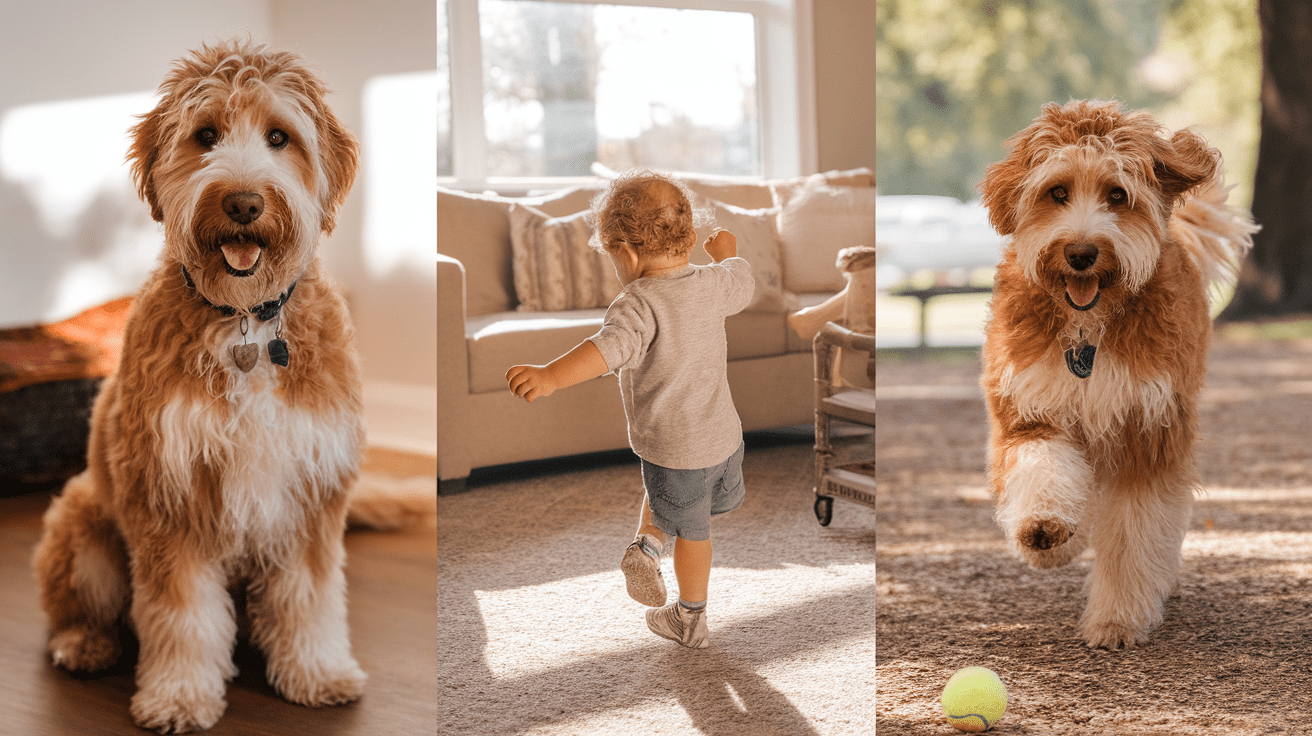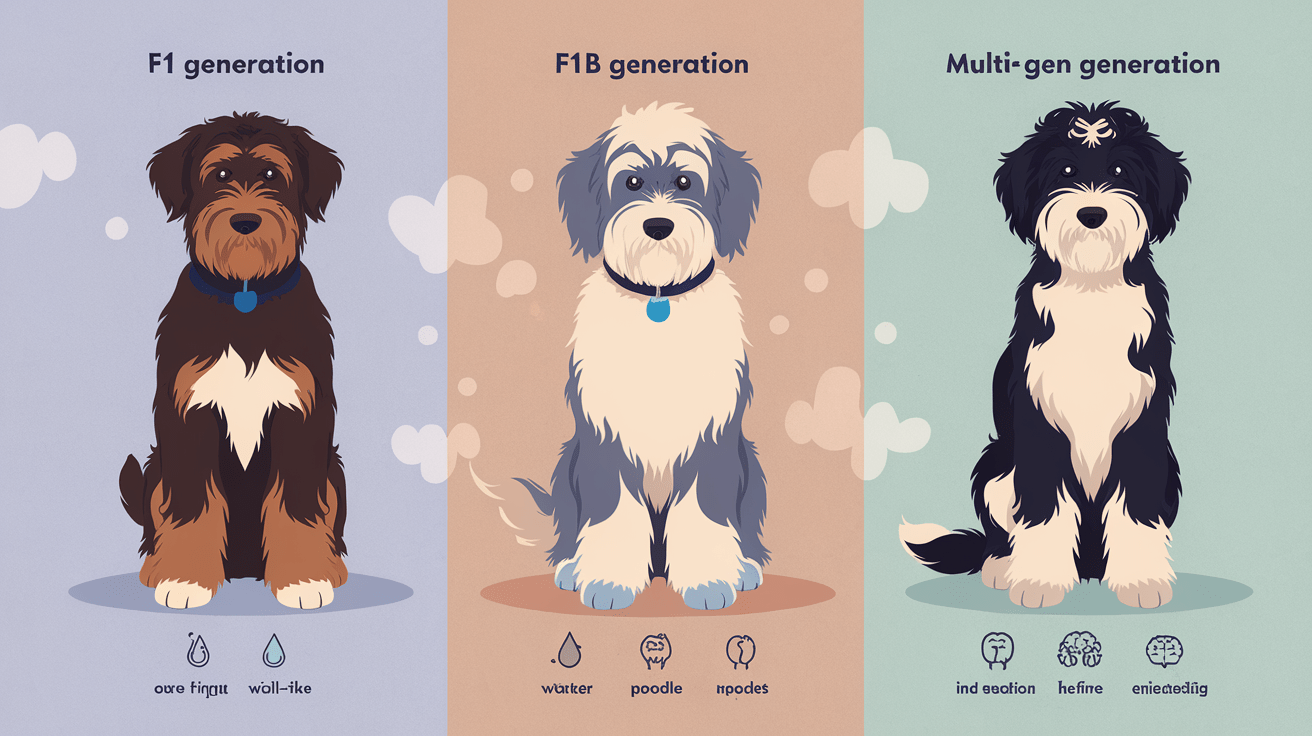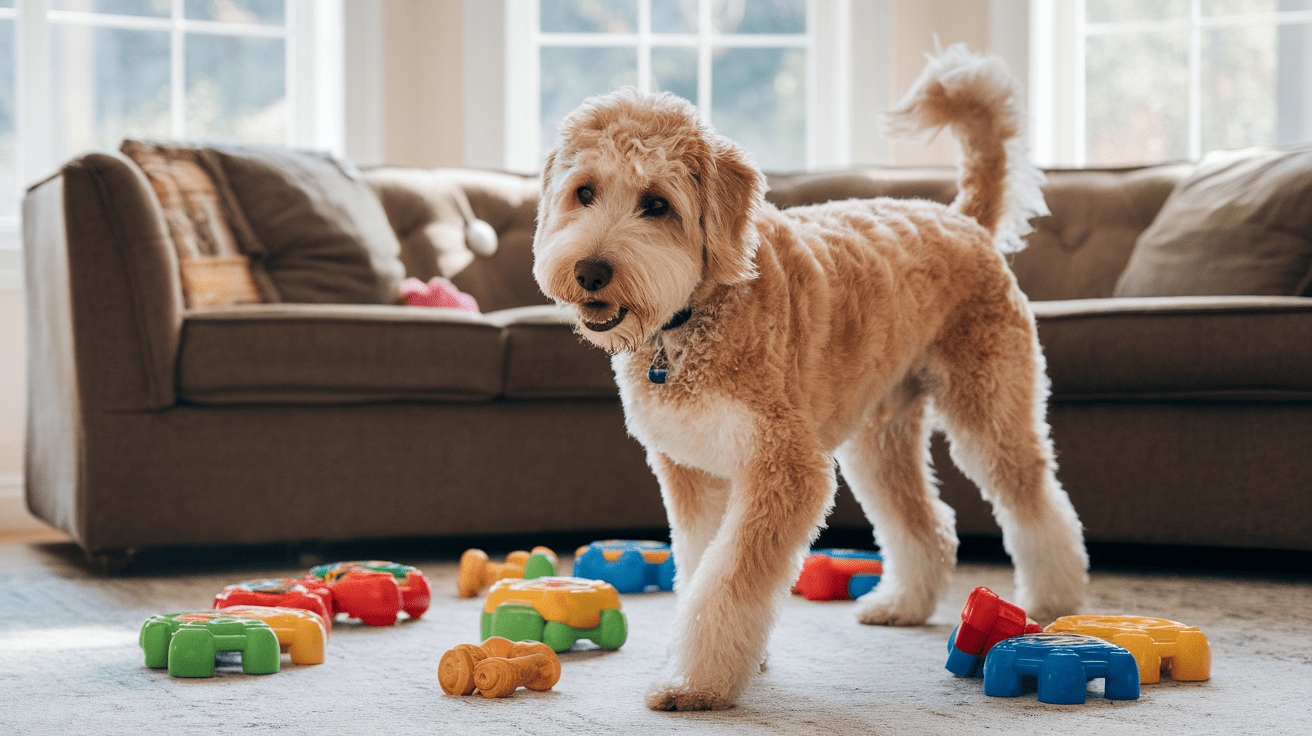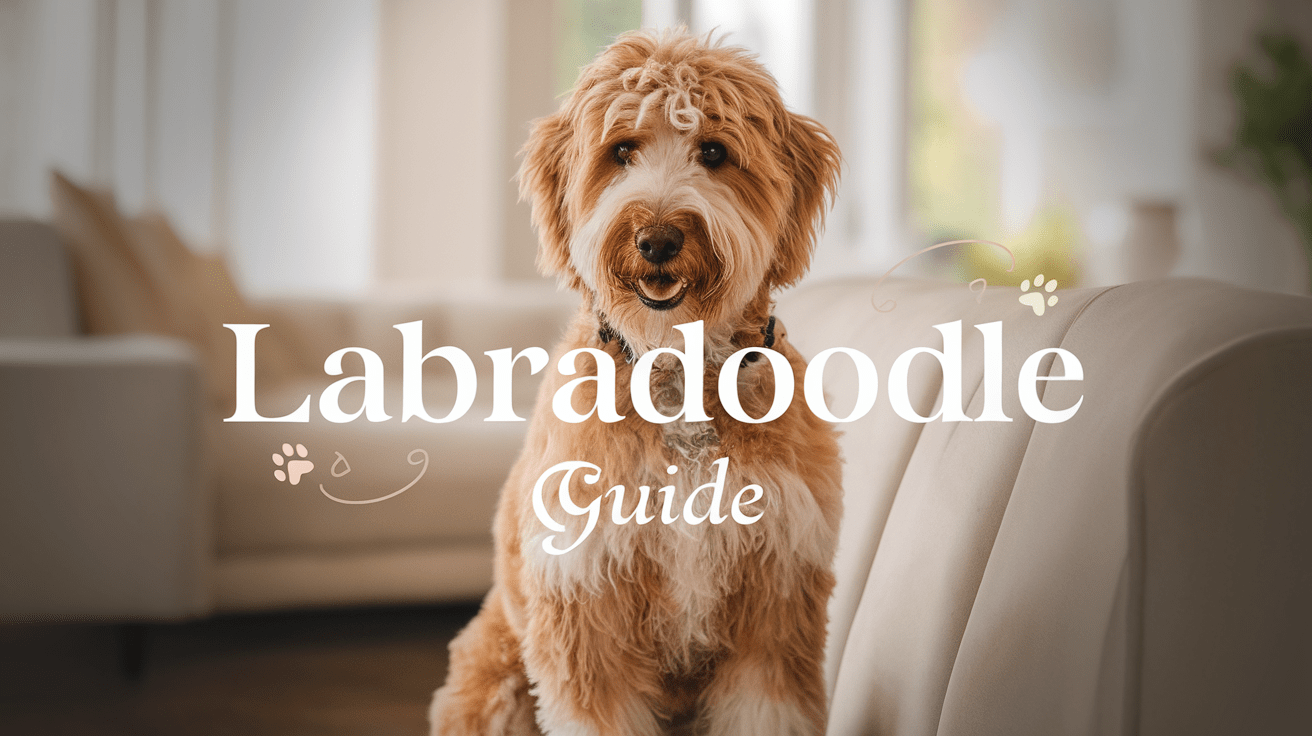Labradoodle Personality Key Takeaways
- ✓ Intelligence: Labradoodles are highly intelligent dogs that can learn commands quickly and excel in obedience training.
- ✓ Exercise Needs: These dogs require about 60 minutes of daily exercise to maintain optimal physical and mental health.
- ✓ Generation Differences: F1 Labradoodles typically show the most balanced blend of parent breeds, while later generations can vary more in personality.
- ✓ Family Compatibility: Labradoodles are naturally sociable and adaptable, making excellent family pets when properly trained and socialized.
Are you considering adding a Labradoodle to your family? As a veterinarian who’s worked with countless Labradoodles over the past decade, I can tell you these lovable mixed breeds are truly something special. According to the American Kennel Club, Labrador Retrievers have been America’s favorite dog for 31 years straight – and when combined with the intelligent Poodle, you get an extraordinary companion in the Labradoodle.
These charming dogs blend the best traits of both parent breeds, creating a unique personality that’s captured hearts worldwide. Whether you’re drawn to their teddy bear looks or searching for a hypoallergenic family pet, understanding a Labradoodle’s personality is crucial before bringing one home. Having treated and observed hundreds of Labradoodles in my practice, I’ll guide you through their distinctive traits, generational differences, and what it’s really like to live with these intelligent and affectionate dogs.
Understanding the Core Traits of Labradoodle Personality

Through my years of veterinary practice, I’ve observed that Labradoodles possess a fascinating blend of characteristics that make them truly unique. In my experience treating these dogs, I’ve noticed they consistently display three core personality traits that define their character.
Intelligence and Trainability
Labradoodles inherit remarkable intelligence from both parent breeds. According to a study in Applied Animal Behaviour Science, both Poodles and Labradors rank among the top 10 most intelligent dog breeds. This translates into a mixed breed that’s incredibly quick to learn – I once worked with a Labradoodle who mastered basic commands in just three training sessions!
Their problem-solving abilities are particularly impressive. Think of them as the “honor students” of the dog world. They can:
• Learn new commands in 5-10 repetitions• Master complex tricks and tasks
• Excel in obedience training
• Demonstrate impressive memory retention
Social Nature and Family Compatibility
What truly sets Labradoodles apart is their exceptional social nature. These dogs genuinely thrive on human interaction – they’re like social butterflies in the dog world. In my practice, I’ve noticed they’re among the most people-oriented breeds, always eager to greet visitors and make new friends.
Their gentle temperament makes them natural family dogs. They typically show remarkable patience with children and an intuitive understanding of how to interact with different family members. Think of them as the diplomatic ambassadors of the dog world – they know just how to adjust their behavior to suit different situations.
Energy Level and Exercise Needs
Labradoodles possess a moderate to high energy level that requires regular outlets. Based on my clinical observations, these dogs need about 60 minutes of daily exercise to maintain optimal physical and mental health. They’re like energetic teenagers – they need structured activities to channel their enthusiasm productively.
For families considering a Labradoodle, I always emphasize the importance of matching their activity level. These dogs excel in various activities:
• Daily walks and jogs• Interactive play sessions
• Swimming (thanks to their water-loving heritage)
• Agility training and dog sports
Understanding these core traits is essential for providing the right environment for a Labradoodle to thrive. When their needs for mental stimulation, social interaction, and physical exercise are met, they truly become the extraordinary companions they’re known to be.
How Labradoodle Personalities Vary by Generation

One fascinating aspect of Labradoodles that I’ve observed in my practice is how their personalities can vary significantly across generations. According to a study in Frontiers in Veterinary Science, hybrid vigor in first-generation crosses often results in more predictable temperamental traits than subsequent generations.
F1 Labradoodle Temperament
First-generation (F1) Labradoodles, born from a purebred Labrador and Poodle, often display the most balanced blend of both parent breeds. In my experience, these dogs typically show:
• Strong retrieving instincts• Excellent water affinity
• Moderate energy levels
• Consistent temperaments
I remember treating an F1 Labradoodle named Max who perfectly embodied this balance – he had the Labrador’s friendly nature combined with the Poodle’s sharp intelligence. Think of F1s as the “classic recipe” in the Labradoodle cookbook – reliable and well-balanced.
F1B and F2 Personality Differences
F1B Labradoodles (F1 crossed back with a Poodle) and F2s (two F1s bred together) show more personality variation. These generations can be like a box of chocolates – you’re never quite sure what combination of traits you’ll get. Through my clinical observations, F1Bs tend to be:
• More Poodle-like in behavior• Highly intelligent
• Sometimes more energetic
• More likely to have hypoallergenic coats
Multi-Generation Labradoodle Traits
Multi-generational Labradoodles (F3 and beyond) represent breeders’ efforts to standardize desired traits. These dogs often show more consistent characteristics, but they can still surprise you with unique personality quirks. They’re like a fine-tuned recipe that’s been perfected over multiple iterations.
I always advise my clients that while generation can influence personality traits, each dog is ultimately an individual. Environmental factors, early socialization, and training play crucial roles in shaping their final temperament. Understanding these generational differences helps set realistic expectations and ensures a better match between dog and family.
Living with a Labradoodle: What to Expect

After years of treating Labradoodles in my veterinary practice, I can confidently say that living with one is like having a perpetually enthusiastic, furry life coach. According to a study in the Journal of Veterinary Behavior, dogs with high trainability and social intelligence, like Labradoodles, form exceptionally strong bonds with their families, leading to greater owner satisfaction.
Daily Interaction and Mental Stimulation
Labradoodles thrive on mental engagement. They’re like smartphones – they need regular recharging through interaction and stimulation. In my experience, a mentally understimulated Labradoodle can become the canine equivalent of a bored teenager. To keep them happy, provide:
• Puzzle toys and food-dispensing games• Training sessions (even just 10-15 minutes daily)
• Rotating toy selection to maintain interest
• Social interaction opportunities
I remember one of my patients, Luna, whose family created a daily “treasure hunt” for her treats. This simple activity kept her mentally engaged and prevented destructive behaviors common in understimulated dogs.
Common Behavioral Traits and Challenges
Living with a Labradoodle means embracing their unique quirks. These intelligent dogs can sometimes outsmart their owners! Common behaviors include:
The “velcro dog” syndrome – many Labradoodles shadow their owners everywhere. While endearing, it’s important to teach independence to prevent separation anxiety. They might also display:
• Excessive greeting behaviors• Counter surfing (thanks to their height and curiosity)
• Mouthiness during play (especially as puppies)
• Occasional stubborn streaks
Compatibility with Children and Other Pets
One of the most remarkable aspects of Labradoodles is their adaptability to family life. They’re like social chameleons, adjusting their behavior to match their playmates. In my practice, I’ve seen countless successful integrations with both young children and other pets.
However, early socialization is crucial. Think of it as sending your dog to kindergarten – these early experiences shape their future interactions. Most Labradoodles excel at:
• Gentle play with children• Sharing space with other pets
• Reading social cues
• Maintaining calm behavior in diverse situations
Remember, while Labradoodles are naturally sociable, each dog is an individual. Proper training, consistent boundaries, and positive reinforcement are essential for developing these inherent traits into reliable behaviors. With the right guidance, your Labradoodle can become an exceptional family member who brings joy and energy to your daily life.
Frequently Asked Questions About Labradoodle Personality
Final Thoughts on Labradoodle Personality
After spending years treating and observing Labradoodles, I can confidently say these dogs are truly remarkable companions for the right families. Their unique blend of intelligence, sociability, and adaptability makes them excellent pets for various lifestyles. However, potential owners should remember that these energetic dogs require significant commitment in terms of exercise, mental stimulation, and social interaction. Whether you choose an F1, F1B, or multi-generational Labradoodle, understanding their personality traits and needs is crucial for a successful partnership. With proper training, socialization, and care, a Labradoodle can become more than just a pet – they’ll be an integral part of your family, bringing joy, laughter, and unconditional love to your home for years to come.
While this article focuses on Labradoodle personality traits, you might want to explore our comprehensive Ultimate Complete Guide to Labradoodles for detailed information about everything from health care and grooming to training techniques and dietary requirements. This in-depth resource combines my veterinary expertise with practical advice to help you provide the best possible care for your Labradoodle companion throughout their life stages.




